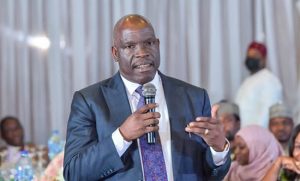The Nigerian Upstream Petroleum Regulatory Commission (NUPRC) says the Shell Petroleum Development Company of Nigeria Limited (SPDC) assets being considered for divestments have an estimated reserve of 4.96 billion barrels of oil.

The Chief Executive of NUPRC, Mr Gbenga Komolafe, disclosed this on Monday, April 29, 2024, in Abuja at the NUPRC-SPDC due diligence divestment workshop.
Komolafe said at the workshop that the assets have reserves of 1.77 billion barrels of condensate, 28.16 trillion cubic feet of associated gas and 28.11 trillion cubic feet of non-associated gas.
The workshop was aimed at discussing the proposed divestment of the participating interests held by SPDC in the SPDC JV Assets, through a sale by the shareholders of all the issued shares of SPDC to Renaissance Africa Energy Company Limited.
The SPDC JV assets are currently operated by the SPDC on behalf of its Joint Venture (JV) partners namely Nigeria National Petroleum Company Limited (NNPC Ltd.), Total Upstream Nigeria Limited, Nigeria Agip Oil Company and SPDC.
“To date, the assets have achieved a cumulative production of 5.35 billion barrels of crude oil, 165. 57 million barrels of condensate, 9.51 trillion cubic feet of associated gas and 3.75 trillion cubic feet of non-associated gas.
“These contribute to the achievement of Nigeria’s crude and condensate output.
“The assets being considered have an estimated total reserve of 4.96 billion barrels of oil, 1.77 billion barrels of condensate, 28.16 trillion cubic feet of associated gas and 28.11 trillion cubic feet of non-associated gas.
“This makes a significant contribution to the nation’s hydrocarbon resources.
“Additionally, these assets hold P3 reserves estimated at 2.85 billion barrels of oil, 850.85 million barrels of condensate, 11.3 trillion cubic feet of associated gas and 12.26 trillion cubic feet of Non-Associated Gas,” he said.
Komolafe said the due diligence meeting would enable the commission to identify a successor who would not only possess the requisite financial resources but also demonstrate the technical expertise to responsibly manage these assets throughout their lifecycle.
He further said that the commission would ensure that the inherent environmental and end-of-life liabilities such as decommissioning liabilities were accurately identified and assigned to the party best equipped to bear the associated risks.
This, he said would necessitate a comprehensive understanding of regulatory requirements, industry best practices and the unique challenges inherent in oil and gas operations.
“To this end, we have implemented robust measures to streamline regulatory procedures and eliminate unnecessary barriers to investment.
“Let me emphasise that the NUPRC wholeheartedly welcomes investment in the Nigerian upstream petroleum sector.
“We recognise the critical role investment plays in driving innovation, creating employment opportunities and ultimately fueling economic prosperity for our nation and its people.
“Therefore, we are always eager to welcome local and international investors who choose to invest in the Nigerian upstream petroleum sector,” he said.
He added that the commission was fully committed to facilitating and supporting investment initiatives that align with national development goals.
Komolafe urged SPDC and Renaissance to engage proactively, adhere to regulatory requirements and work collaboratively with the NUPRC to ensure the successful conclusion of the Shell Divestment.
“As regulators, we will ensure that this evaluation is conducted with precision and impartiality, with a focus on transparency and accountability,” he said.
He lauded President Bola Tinubu for his support and commitment towards ensuring a purposeful leadership that would attract investment and development of the country’s oil and gas sector.
NUPRC has developed a Divestment Framework consisting of seven cardinal pillars to guide the assessment of applications for Ministerial consent to the SPDC divestments and other similar divestments.
By Emmanuella Anokam
